Zhisheng Ye
LEMUR: Large scale End-to-end MUltimodal Recommendation
Nov 17, 2025Abstract:Traditional ID-based recommender systems often struggle with cold-start and generalization challenges. Multimodal recommendation systems, which leverage textual and visual data, offer a promising solution to mitigate these issues. However, existing industrial approaches typically adopt a two-stage training paradigm: first pretraining a multimodal model, then applying its frozen representations to train the recommendation model. This decoupled framework suffers from misalignment between multimodal learning and recommendation objectives, as well as an inability to adapt dynamically to new data. To address these limitations, we propose LEMUR, the first large-scale multimodal recommender system trained end-to-end from raw data. By jointly optimizing both the multimodal and recommendation components, LEMUR ensures tighter alignment with downstream objectives while enabling real-time parameter updates. Constructing multimodal sequential representations from user history often entails prohibitively high computational costs. To alleviate this bottleneck, we propose a novel memory bank mechanism that incrementally accumulates historical multimodal representations throughout the training process. After one month of deployment in Douyin Search, LEMUR has led to a 0.843% reduction in query change rate decay and a 0.81% improvement in QAUC. Additionally, LEMUR has shown significant gains across key offline metrics for Douyin Advertisement. Our results validate the superiority of end-to-end multimodal recommendation in real-world industrial scenarios.
Characterization of Large Language Model Development in the Datacenter
Mar 12, 2024Abstract:Large Language Models (LLMs) have presented impressive performance across several transformative tasks. However, it is non-trivial to efficiently utilize large-scale cluster resources to develop LLMs, often riddled with numerous challenges such as frequent hardware failures, intricate parallelization strategies, and imbalanced resource utilization. In this paper, we present an in-depth characterization study of a six-month LLM development workload trace collected from our GPU datacenter Acme. Specifically, we investigate discrepancies between LLMs and prior task-specific Deep Learning (DL) workloads, explore resource utilization patterns, and identify the impact of various job failures. Our analysis summarizes hurdles we encountered and uncovers potential opportunities to optimize systems tailored for LLMs. Furthermore, we introduce our system efforts: (1) fault-tolerant pretraining, which enhances fault tolerance through LLM-involved failure diagnosis and automatic recovery. (2) decoupled scheduling for evaluation, which achieves timely performance feedback via trial decomposition and scheduling optimization.
Deep Learning Workload Scheduling in GPU Datacenters: Taxonomy, Challenges and Vision
Jun 01, 2022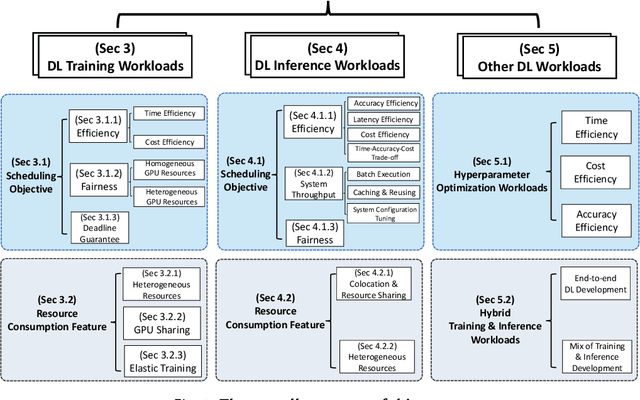
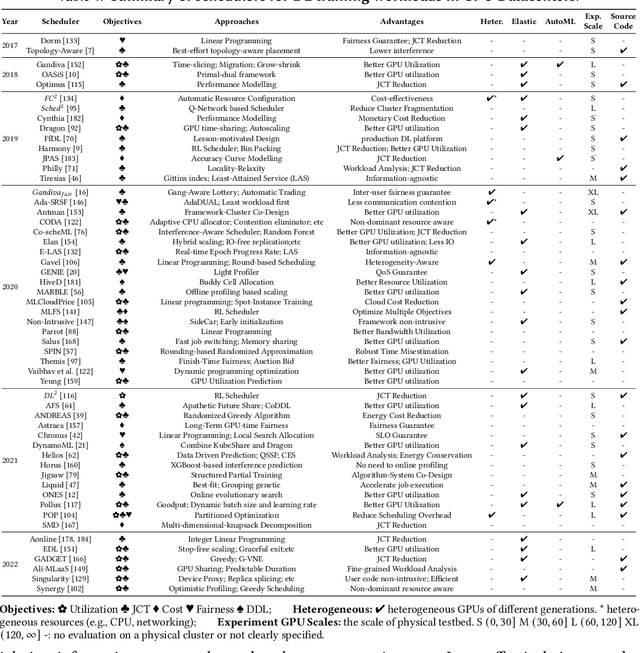
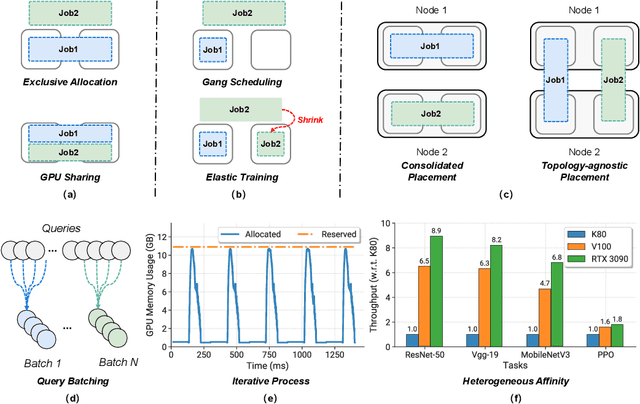
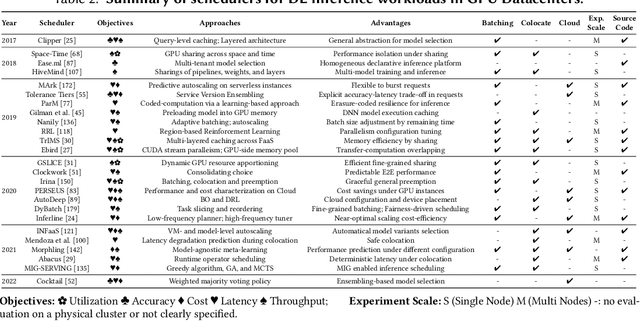
Abstract:Deep learning (DL) shows its prosperity in a wide variety of fields. The development of a DL model is a time-consuming and resource-intensive procedure. Hence, dedicated GPU accelerators have been collectively constructed into a GPU datacenter. An efficient scheduler design for such GPU datacenter is crucially important to reduce the operational cost and improve resource utilization. However, traditional approaches designed for big data or high performance computing workloads can not support DL workloads to fully utilize the GPU resources. Recently, substantial schedulers are proposed to tailor for DL workloads in GPU datacenters. This paper surveys existing research efforts for both training and inference workloads. We primarily present how existing schedulers facilitate the respective workloads from the scheduling objectives and resource consumption features. Finally, we prospect several promising future research directions. More detailed summary with the surveyed paper and code links can be found at our project website: https://github.com/S-Lab-System-Group/Awesome-DL-Scheduling-Papers
The Internet of Federated Things : A Vision for the Future and In-depth Survey of Data-driven Approaches for Federated Learning
Nov 09, 2021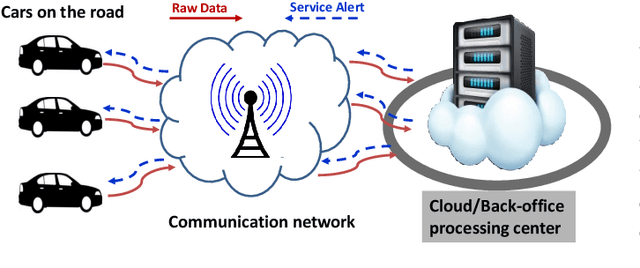
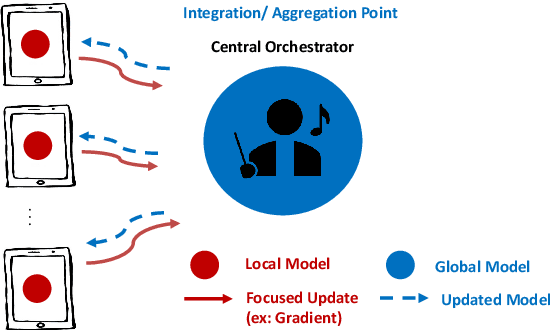
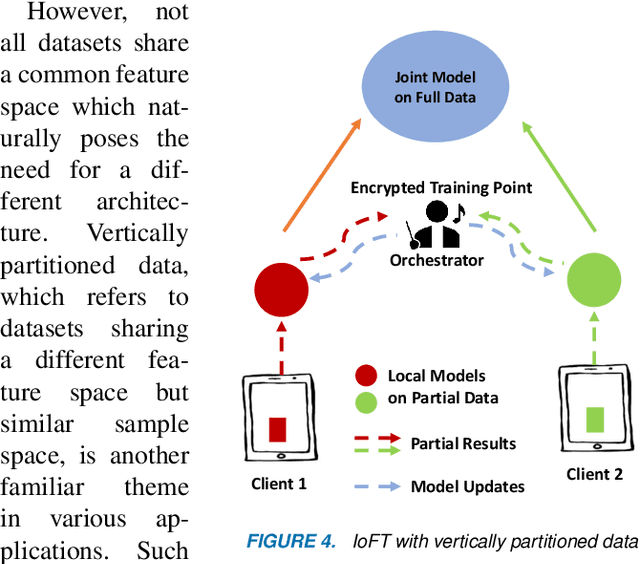
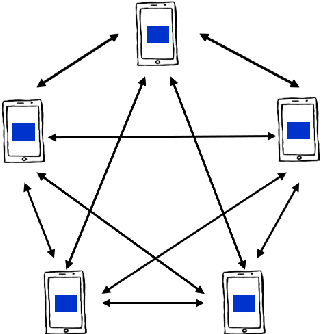
Abstract:The Internet of Things (IoT) is on the verge of a major paradigm shift. In the IoT system of the future, IoFT, the cloud will be substituted by the crowd where model training is brought to the edge, allowing IoT devices to collaboratively extract knowledge and build smart analytics/models while keeping their personal data stored locally. This paradigm shift was set into motion by the tremendous increase in computational power on IoT devices and the recent advances in decentralized and privacy-preserving model training, coined as federated learning (FL). This article provides a vision for IoFT and a systematic overview of current efforts towards realizing this vision. Specifically, we first introduce the defining characteristics of IoFT and discuss FL data-driven approaches, opportunities, and challenges that allow decentralized inference within three dimensions: (i) a global model that maximizes utility across all IoT devices, (ii) a personalized model that borrows strengths across all devices yet retains its own model, (iii) a meta-learning model that quickly adapts to new devices or learning tasks. We end by describing the vision and challenges of IoFT in reshaping different industries through the lens of domain experts. Those industries include manufacturing, transportation, energy, healthcare, quality & reliability, business, and computing.
A Unifying Framework for Variance Reduction Algorithms for Finding Zeroes of Monotone Operators
Jun 22, 2019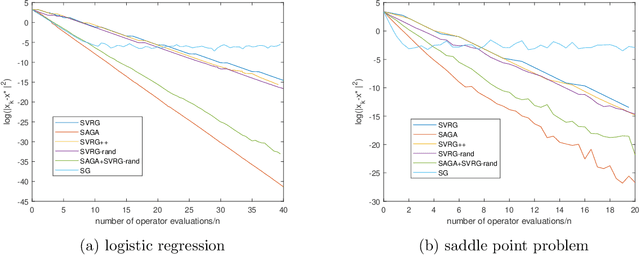
Abstract:A wide range of optimization problems can be recast as monotone inclusion problems. We propose a unifying framework for solving the monotone inclusion problem with randomized Forward-Backward algorithms. Our framework covers many existing deterministic and stochastic algorithms. Under various conditions, we can establish both sublinear and linear convergence rates in expectation for the algorithms covered by this framework. In addition, we consider algorithm design as well as asynchronous randomized Forward algorithms. Numerical experiments demonstrate the worth of the new algorithms that emerge from our framework
 Add to Chrome
Add to Chrome Add to Firefox
Add to Firefox Add to Edge
Add to Edge